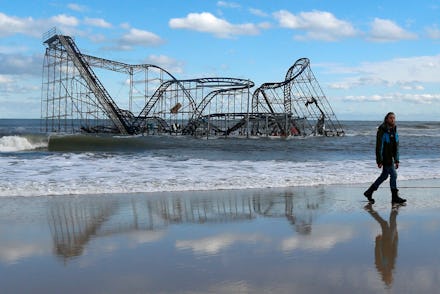GOP is happy to spend billions on Trump's wall. Here's what they didn't want to pay for.

President Donald Trump is seeking billions of federal dollars to pay for his pet border wall between the United States and Mexico — an $8 to $14-billion price tag Republican House Speaker Paul Ryan said Thursday he's happy to foot, even without a clear revenue source.
Yet for the past eight years, Republicans railed against bills that had hefty price tags and no clear source of funding, saying they'd rack up the already ballooning federal debt.
In fact, there were a number of things the GOP Congress initially fought funding for because of the impact on the debt — everything from aid to American families who lost their homes in natural disasters, to health care for 9/11 first responders who were sickened from the air quality while working at Ground Zero.
The GOP's willingness to rack up debt for an unpopular border wall that polls show just 37% of Americans support, yet hold up aid to suffering Americans has already sparked a lout outcry from lawmakers and others, who were quick to point out Ryan and the Republican Party's hypocrisy.
Here's just a partial list of things Republicans initially refused to increase the debt for.
Health care for 9/11 first responders
When first responders who worked to comb through the rubble of the World Trade Center after the Sept. 11, 2001, attacks started to get sick and die from cancer and lung disease, New York lawmakers sought to create a program to help pay for the health care of those first responders.
A bill to help pay for those costs was first introduced in 2006 by Rep. Carolyn Maloney (D-NY), and then New York Sen. Hillary Clinton.
However, Republicans fought that legislation — which they said was too expensive — for four full years before finally relenting to pressure in 2010.
Funding for the program was temporary, however, and it expired in September.
And Republicans in Congress once again fought the bill because of its impact on the debt.
Comedian Jon Stewart, a New Yorker and former host of The Daily Show who lobbied for funding for the 9/11 responders, came back to the fray to publicly shame Congress into permanently funding health care for those sickened from working at Ground Zero.
The bill passed nearly three months later in December 2016.
Hurricane Sandy aid
When a powerful hurricane blasted the northeast in 2012, members of Congress from the impacted states sought disaster relief funding to help clean up the damage.
But congressional Republicans held up the bill, demanding spending cuts in other areas to offset the cost — a demand rarely, if ever, made for disaster relief.
Two months later, Congress finally approved spending for Hurricane Sandy disaster relief.
Still, a number of Republicans voted against the aid because of debt concerns. That includes Ryan, who now is OK with a debt-busting Mexican border wall.
The Flint water crisis
The crisis over high levels of led in the tap water in Flint, Mich., began in 2014 .
And for nearly two full years, Congress fought over an aid package to help bring back drinkable water to the city.
Republicans initially questioned whether the federal government should be involved in doling out funding to help Michigan resolve the problem.
And it wasn't until December that Congress finally came to an agreement on an aid package
Zika virus funding
When the Zika virus — a mosquito-borne illness that was linked to birth defects in Central and South America — reached American shores, local leaders pleaded with Congress for funding to try and eradicate the illness.
The ask for funding sparked an ugly fight in Congress.
Republicans agreed to fund the bill if costs were offset, and sought to pay for those offsets with cuts to things like Planned Parenthood — a nonstarter for Democrats.
After seven months of fighting, Congress finally passed a Zika aid bill in September.